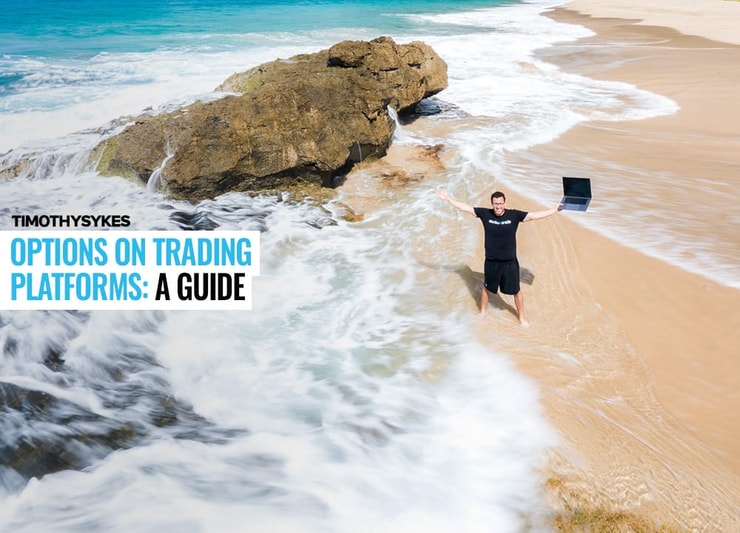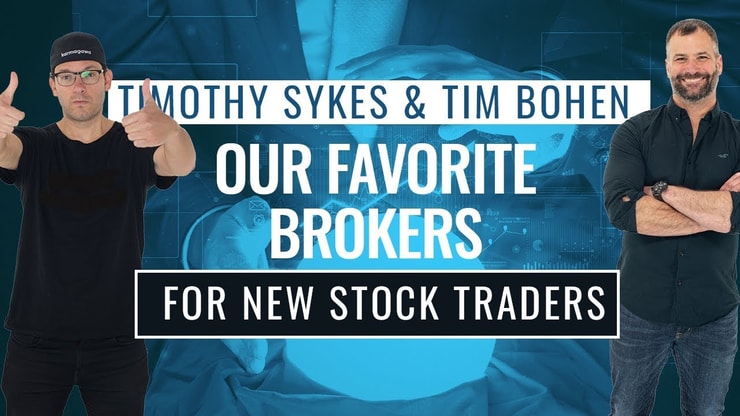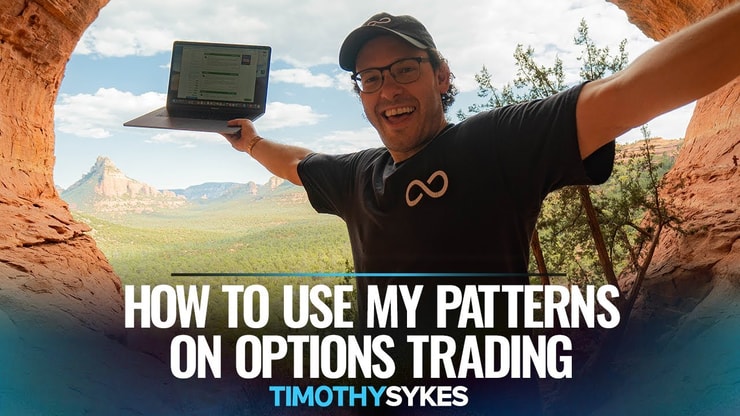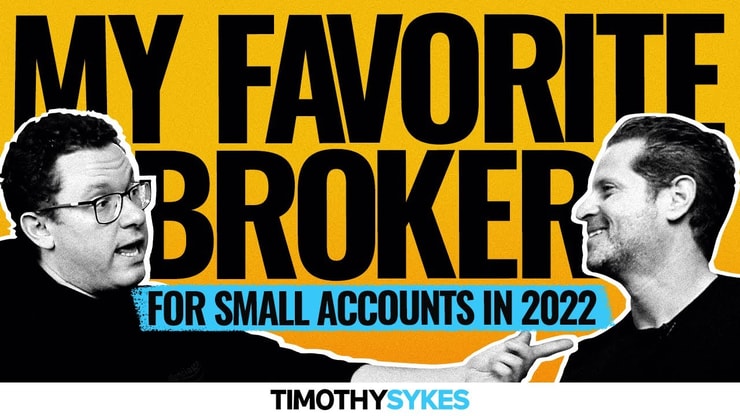Like other trading strategies, options trading needs a trading platform that fits your needs. And the needs of options traders can vary wildly.
Some options traders are basically swing traders, trading on a stock’s current movement. Charts will help them as much as any other stock trader.
Some are super technical. Platforms with options-specific technology often appeal to them.
Whether you’re a new trader looking for your first broker or an advanced trader looking to switch, this guide is for you. Read on to see my favorite platforms for options trading!
Table of Contents
- 1 What Is an Options Broker?
- 2 Why You Should Use a Broker for Options Trading
- 3 What to Look For in an Options Trading Broker
- 4 What to Avoid in an Options Trading Broker
- 5 Trading Platforms That We Like
- 5.1 1. E-Trade — The Go-To Options Trading Platform
- 5.2 2. Interactive Brokers — The Most High-Tech Options Trading Platform
- 5.3 3. TradeZero — The Best Options Trading Platform for Small Accounts
- 5.4 4. Thinkorswim — The Options Trading Platform with the Broker Advantage
- 5.5 5. StocksToTrade — My Future Favorite Options Trading Platform
- 6 Final Thoughts
- 7 Options on Trading Platforms FAQs
What Is an Options Broker?

2025 Millionaire Media, LLCAn options broker is any broker that will let you trade options. Most U.S. brokers let you trade options, although some limit the complexity of the options trades they offer.
Unlike stock trading, most options brokers have a validation process for trading options. This process includes questions about your trading experience, account size, and goals. Based on your answers, they’ll let you access different levels of options complexity.
Most options brokers require that you have a margin account to trade options — even if they won’t allow you to trade margined options. The equity requirements rise for different options strategies. Some get as high as $1 million!
Like the PDT rule, I think these rules can be a good thing. They force traders to acknowledge their limits. Traders who don’t know how to limit themselves often blow up their accounts.
Rule #1: cut losses quickly, rule #2, obey rule #1
— Timothy Sykes (@timothysykes) November 28, 2017
Why You Should Use a Broker for Options Trading
You should use a broker to trade options because there’s no other way! The real question is: how do you find the right broker?
The catch is — there’s no one perfect broker for everyone. What works for a new trader might not be right for an experienced options trader. This means you have to find a broker that fits your trading style and goals.
What to Look For in an Options Trading Broker

2025 Millionaire Media, LLCWhat you’re looking for in an options trading broker is a good fit for your trading strategy. Here are the top differentiators you should be looking at:
- Options offerings
- Market reach
- Trading platform technology
- Execution quality
But often it’s the small differences around the edges that make the biggest difference. Here are some other things to consider when looking for an options trading broker.
Trading Commissions
Just like stock trading, options trading comes with fees. Most brokers usually charge a per-contract fee. This fee sits around $0.65 for most options brokers, and gets multiplied in multi-leg options chains.
Unlike many traders, I don’t think fees are a bad thing — they make you invest in your trades. If you can’t rationalize a trade that will incur some cost, you probably shouldn’t make that trade. But you still have to factor these costs into your trading plan.
You should also watch out for hidden charges. Always review a broker’s cost breakdown before deciding to use its platform.
Learning Resources
Trading options contracts can be confusing, especially as a newbie. Great options platforms should have educational content and online resources to help answer the easy questions.
More Breaking News
- Stellantis Stock Surge: Analyzing the Latest Performance
- TransMedics Group: Is a Surge Unfolding?
- Verve Therapeutics: FDA Nod Sparks Stock Surge
Mobile Trader App
Desktop trading software is better in most cases. Whether you’re a new trader or an advanced trader, a desktop platform will offer a better interface and more features.
But, again, you want a broker that fits your needs. The point of the trading lifestyle isn’t to lock yourself into a different kind of 9–5 job — you should be taking advantage of the flexibility that trading can afford.
Active traders who don’t want to be tied to their computer can use a mobile app to track a stock or even to trade. You’ll want the mobile app to be well integrated into the desktop platform so you can seamlessly continue trading at home.
Authorization Requirements
Like I mentioned above, most platforms for options trading will need to authorize you before you can trade options with them. Most will also require a minimum deposit. Make sure you understand these requirements and are prepared to meet them.
Customer Service
Most of the time, you won’t need to interact with the people who work for your broker. But when you do, good customer service is crucial.
Subpar online brokers sometimes cut corners when it comes to customer service. If a broker doesn’t offer live phone or chat service, they probably won’t be very responsive when you need them.
Account Security
You should only be worried about losing money in the losses you hopefully cut very quickly…. A good broker should protect you against other money-risking possibilities.
Your broker should have security measures to protect its customers’ money. Find a broker that uses two-factor authentication, fraud protection, and other safeguards.
They should also be SIPC insured (most U.S.-based brokers are). SIPC insures your account up to $500,000, which includes up to $250,000 protection for your cash balance.
International Trading
International trading can mean a few things in the options world. If you’re an international trader looking to trade U.S. options, there are several brokers that will let you. Interactive Brokers is the best known and one of the better choices out there (it’s also #2 on our list).
As for U.S. traders looking for options on stocks in international markets, there are a few ways to go about this. Many of the bigger foreign stocks are traded on U.S. exchanges or in the OTC market. Most U.S. brokers will allow you to trade options on these stocks in the same way that you can trade options on domestic stocks.
The third thing this means to some traders are so-called “European options.” European options aren’t options on stocks in European markets — they’re just a different kind of stock option. European options can only be exercised on the expiration date, while American options can be exercised anytime before or on their expiration.
Additional Trading Options
If you’re just beginning to trade options, you’re probably early on your trading journey. Find a broker that offers more than just options trading, so that you can see what works best for you.
What to Avoid in an Options Trading Broker

2025 Millionaire Media, LLCYou should avoid the same things in an options trading broker that you’d avoid trading anything. This includes brokers that:
- Experience frequent outages
- Have poor executions
- Are not legally regulated
That last one is easy to avoid — I do so by sticking with U.S.-registered brokers, even if offshore brokers offer some enticing deals. They’re just too risky.
As far as outages and executions, it’s hard to know which brokers are bad before actually using them. They’re legally required to claim they fulfill your orders to the best of their ability.
Remember: there’s no perfect broker, you’re just looking for the broker that gets in the way the least. When a broker annoys you too much with platform lag or unfilled orders, it may be time to try another broker.
If you just want to get a feel for a platform’s trading experience, you can try its trading simulator. This will get you the closest you can get to real trading without risking your account.
Want to learn from the best options trader I know? Sign up for Mark Croock’s Evolved Trader program today!
Trading Platforms That We Like
My options trading platform picks are:
- E-Trade — The Go-To Options Trading Platform
- Interactive Brokers — The Most High-Tech Options Trading Platform
- TradeZero — The Best Options Trading Platform for Small Accounts
- thinkorswim — The Options Trading Platform with the Broker Advantage
- StocksToTrade — My Future Favorite Options Trading Platform
No trading platform or broker is perfect — luckily, you don’t have to choose. You can try as many as you like, and see which one fits you best.
When evaluating options trading platforms, I’ll look at a platform holistically. If you’re options trading on a platform, it’s likely that you’ll be stock trading on it too. I never want a platform to limit my trading choices.
Let’s get into my options trading platform picks!
1. E-Trade — The Go-To Options Trading Platform
My first options trading platform pick is E-Trade.
That doesn’t make it the best option for everyone — or even for me all the time. But E-Trade is one of the brokers that both Mark Croock and I use most.
That means we know its strengths and weaknesses, and understand how to work with them…
I’ve been trading for over 20 years. Mark has been trading for 13 years. The fact that we both still use this broker should tell you something.
Remember: you’re looking for the broker that gets in the way the least. Most of the time, E-Trade checks that box.
And its Power E-Trade platform can compete with other options trading platforms.
You can see the E-Trade account Mark uses to train his Evolved Trader students here:
Why I Like It
When E-Trade bought the options-focused platform OptionsHouse in 2017, the trading platform market was a simpler place. Now, with the help of the OptionsHouse suite of tools, Power E-Trade can compete in the options platform arms race.
Trading is a battlefield, and Power E-Trade has some 007-level options tools in its arsenal. These include:
- Spectral Analysis — this tab provides “what if” scenarios and risk metrics in plain English
- Earnings Move Analyser — this gives you a stock’s expected price move, average implied move, and average historical move. You can order directly from the tool
- Strategy Seek Scanner — this is one of the coolest tools. It lets you scan for options trades by target price, date, and type, instead of searching by stock and then figuring out if the available trades fit your risk tolerance
2. Interactive Brokers — The Most High-Tech Options Trading Platform
My second options trading platform pick is Interactive Brokers (IBKR).
IBKR is another one of my go-to platforms. It’s also one of the more advanced trading platforms out there. This can be a good or bad thing, depending on how much time you’re willing to invest in the learning curve.
You know what I think…
You have 2 choices in life: to be lazy and average or push yourself every single day to maximize your opportunities…so which is it?
— Timothy Sykes (@timothysykes) November 26, 2017
I like IBKR for more than just its tech. It allows you to trade pretty much any stock, in pretty much any market, no matter where you are in the world…
If you’re looking for a broker that doesn’t get in the way, all of that is a pretty good start!
IBKR also has some of the best executions available to its IBKR Pro users, who get to decide their own order routing. This means they don’t need to rely on whichever market maker pays the most for the honor.
Why I Like It
Options traders are spoiled for tech on IBKR’s desktop platform, Trader Workstation (TWS). Built-in tools include:
- OptionTrader — this is the options command center of TWS. It gives a single-screen readout of available option chains, while its Combo Tab allows you to build multi-leg options chain in as little as three clicks
- Write/Rollover Options Tool — the Write tool evaluates your portfolio and creates options for your uncovered positions so you can hedge them, while the Rollover tool trades the options you’re holding for similar but later-expiring ones
- Options Strategy, Probability, and Volatility Labs — there are a ridiculous amount of analytical possibilities here for advanced options traders
3. TradeZero — The Best Options Trading Platform for Small Accounts
My third options trading platform pick is TradeZero.
There’s a caveat here — TradeZero only allows single-leg options trades for now. They’re working on expanding to multi-leg options trades in the future.
That doesn’t affect my read on TradeZero. I still think it’s the best platform for small accounts.
I test-drove this theory myself with a $12,000 account. I made some great trades with my TradeZero account, including my first short sale in YEARS.
I made $1,081 shorting Global Tech Industries Group Inc. (OTCQB: GTII — starting stake $7,600). This wouldn’t have been possible without TradeZero — E-Trade didn’t have any shares available of this hard-to-borrow stock.
So awesome to see a gimme like $GTII play out EXACTLY as I laid out in my weekend video lesson/watchlist, SUCH a solid short (thanks https://t.co/NXt3gqdzfb for the borrow!) & classic https://t.co/4lKUY5BE04 dip buy too…STUDY HARD TO PREPARE & BE PATIENT FOR THESE PERFECT PLAYS
— Timothy Sykes (@timothysykes) October 3, 2022
Why I Like It
ZeroPro is a sleek, advanced platform. It features powerful and eye-catching charting and customizable tools. It doesn’t have much in the way of options tools, but the rest of its capabilities more than make up for it:
- Stock Locator — without a doubt, this is ZeroPro’s most valuable feature. It gives short sellers access to one of the best selections of hard-to-borrow stocks in the market. It also gives you the option to sell your short reservation back to another short seller if you don’t go through with the trade
- Direct Routing — like IBKR, TradeZero gives its pro-level traders the power to route their own orders
- High/Low Ticker Box — a special feed dedicated to one of the market’s most enduring indicators — price action at 52-week and intraday highs and lows
Sign up to TradeZero here and get a free gift!
4. Thinkorswim — The Options Trading Platform with the Broker Advantage
My fourth options trading platform pick is thinkorswim.
By the end of 2023, Schwab traders will get access to thinkorswim. TD Ameritrade account holders have used this platform since 2009.
That means that if you have an account with the biggest broker in the world, you will have access.
At a time when most brokers were proud just to have a functioning website, thinkorswim was setting the standard for trading platform technology. At this point, some parts seem a bit overly-complicated, laggy, and not user friendly…
This is all to say, your mileage may vary.
Why I Like It
I’m one of those advanced traders, and I still like thinkorswim. It’s powerful and quirky, with so much customizability that you can even build in a Tetris pane into your custom workstation! Options traders will also appreciate these tools:
- Options Probabilities — this quick risk/reward analysis is integrated into thinkorswim’s options chain builder
- Trade Analysis — this window looks at all the options trades made for a specific date and breaks them down by category
- Sizzle Index — this is an awesome tool for volume traders. It compares the day’s options volume for a stock with the previous five days
5. StocksToTrade — My Future Favorite Options Trading Platform
My fifth options trading platform pick is StocksToTrade.
It isn’t an option right now. But when StocksToTrade finishes building options trading into its platform, it’s likely that my favorite stock trading platform will become my favorite options trading platform.
Why I Like It
I helped design StocksToTrade, so of course I’m going to like it. It has some of the best tools available in any platform. It continues to help my trading every day — here’s how:
- Clear, customizable charts — charting is trading’s lifeblood, and StocksToTrade’s charts are intuitive, powerful, and beautiful
- A wide-ranging news scanner — I used to have to check 20 different windows to find what StocksToTrade delivers in one window. Its social media tool deserves its own mention
- The incredible Breaking News Chat — the two analysts behind Breaking News Chat continually pump out info of the highest quality. They’ve given me ideas for countless trades. It’s my secret weapon — and it should be yours too!
EVERYONE needs to use the @StocksToTrade social media search tool & breaking news tool, they’ll open your eyes to what’s happening these days across so many chat rooms/websites/“communities”, pretty amazing to see the pumping of stocks like $FWP $GNUS $FRSX $CREX
— Timothy Sykes (@timothysykes) May 13, 2020
Get your 14-day StocksToTrade + Breaking News Chat trial here — only $17!
Final Thoughts
Choosing the right options trading platform is complicated because of all the variables involved. The broker behind the platform needs to offer you the right options products and education, and the trading platform should be comfortable to use. This is not a one-size-fits-all question.
Your broker also determines what options trading level you qualify for. Options trading can be highly risky, and you need to trust your broker as much as they trust you.
In the end, your broker will only execute the trades you ask them to. Finding the right options trading platform is a process. Keep investing in your education and you’ll eventually find the trading platform that best suits your needs.
What platform do you use for options trading? Share with me in the comments below!
Options on Trading Platforms FAQs

2025 Millionaire Media, LLCLet’s cut to the chase.
Which platform is best for options trading?
The best platform for options trading is the one that fits your options strategies the best. Most options traders look for a platform that has clean charts, cool options-specific tools, and is connected with a good options broker.
What platforms offer free options trading?
Not many platforms offer free options trading, as most brokers charge a small fee per contract. Robinhood and Webull are exceptions here.
But commission-free trading isn’t everything. If your trade isn’t profitable after you factor in fees, it probably isn’t worth making.
Which apps have options trading?
Most broker-connected apps like thinkorswim, Power E-Trade, and Fidelity Investment let you trade options contracts. Other apps like StocksToTrade are not broker-specific, so you have to make sure that both the app and the broker it’s plugged into support options trading.







Leave a reply